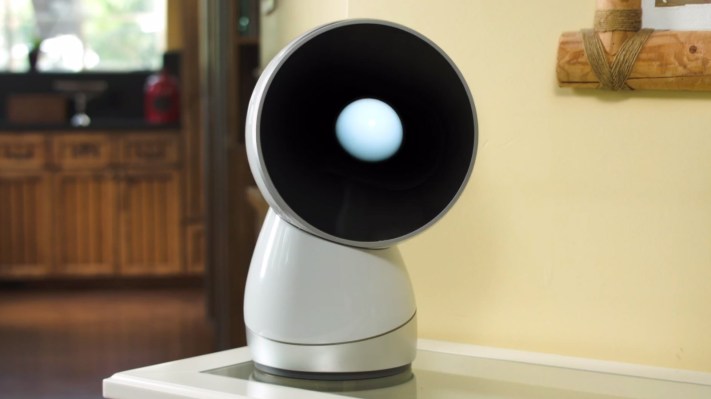Jibo blinks. Jibo winks. Jibo swivels hither and thither. Jibo is chipper. Jibo is polite. Jibo is cute as a button. Never mind its swiveling head turns all the better for algorithms to monitor the faces of your family so it knows exactly who’s in the room and what they’re saying.
Jibo is the friendly cutesy face of a new generation of AI devices aiming to take up position in the heart of your home. It’s touch sensitive, has cameras so it can see you, voice recognition tech to be able to distinguish between one stroppy teenager and another, and a cloud platform where it stores the family photos it takes for you.
Privacy? Pshaw! Who cares about being remotely monitored in your own home when the surveillance terminal in question has such an adorable aura. Jibo blinks. Jibo winks. Jibo swivels hither and thither. Jibo is chipper. Jibo is polite. Jibo is cute as a button…
Jibo is also just a vision (and a prototype) at this point — with a consumer release of the product not slated til December 2015 and a full public release not til early 2016.
But this vision has already pulled in $356,000+ and counting via the Indiegogo crowdfunding platform, with a full month left of its funding campaign to run.
The WALL-E-esque marketing video (embedded below) can surely take a big slice of the credit for that.
The project is founded by MIT professor and social robotics specialist, Dr Cynthia Breazeal, drawing on her research to make a commercial bot for the first time, rather than a research robot.
So what exactly will Jibo be able to do when it does become a commercial reality — given its makers have already pulled in more than 3.5x their original funding goal, so do have the means to build it.
(Whether they can build a device that’s slick enough to genuinely be useful and helpful, is another very open question. We’ve seen similar Wi-Fi connected devices before, such as the Nabaztag rabbit, which nonetheless didn’t manage to go the distance.)
Jibo is being designed as an open platform that supports third party applications (although its own code is closed), so the big vision is for myriad apps — or ‘skills’ as they call apps — to extend the functions of this “social robot” over time.
The initial feature-set of Jibo is being designed with busy families in mind — so will include being able to act as a telepresence terminal to allow remote family members to take part in a family videocall with the bot moving its lenses to keep track of multiple participants; take handsfree photographs and video, including the ability to recognise when people are smiling or otherwise posing and snap a well-composed shot; read messages and calendar reminders to individual family members, again based on recognizing the individual so they get they right missives; and a storytelling function that could be used to keep kids entertained, by incorporating graphics and physical movements to enhance the experience.
The 11 inch tall bot will also come with a pretty hefty price-tag — costing around $500 for one consumer unit. The developer edition starts at $599 and aims to ship a little sooner, in September 2015.
It’s interesting to note that while Jibo is being described by its makers — in human terms — as having “skills” and being “social”, the design of the bot shies away from giving it facial features. Rather the look is more ‘anthropomorphised cartoon table lamp’.
That of course avoids the uncanny valley pitfall that designers of humanoid robots still run into — whereby the disconnect between how simultaneously similar and dissimilar a human-esque creation looks to a (genuine) human eye lends it a sinister or otherwise unpleasant aura.
By opting for a cartoonish design — which looks like it could have come straight off a drawing board in Pixar’s animation studios — Jibo’s makers are not only looking to appeal to families with kids but dressing up what is, in one sense, a tracking and monitoring terminal in reassuringly friendly clothing. But you’re opting in to being watched because you’re getting something really useful in return right?
On the privacy point, the Indiegogo campaign page notes: “Guarding our users’ privacy is something we take very seriously. We work hard to protect your information from unauthorized access and have designed policies and controls to safeguard the collection, use, and disclosure of your information.”
We’ve asked Jibo Inc for full details of its privacy policy and how it intends to use the data gathered by the devices in people’s homes, and will update this post with any response.
